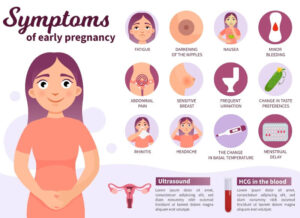Early Pregnancy Symptoms After Ovulation
The moment you learn you’re expecting a baby is life-changing, but for many women, the first signs of pregnancy are subtle and easy to miss. Knowing what to watch for, when and how to take a pregnancy test, and when to seek prenatal care is essential if you’re trying to get pregnant. This guide offers everything you need to know as a hopeful mom-to-be.
Very Early Signs of Pregnancy
The onset of symptoms varies from one pregnancy to the next. Some women notice pregnancy symptoms starting within a few days of conception, while others don’t experience symptoms for several weeks. In general, pregnancy symptoms appear around the time you miss your period or shortly thereafter. These early signs differ for everyone, but here are some common pregnancy symptoms to watch for:
- Spotting: About one in four women experience spotting when they become pregnant. Also known as implantation bleeding, spotting may occur when the fertilized egg attaches to the uterine lining, typically six to 12 days after ovulation. This light bleeding is usually lighter in color and shorter in duration than your regular period.
- Breast changes: You may notice darker nipples, breast tenderness, and a swollen or full feeling as early as one to two weeks after conception. These changes are caused by hormonal shifts that prepare your body for breastfeeding.
- Morning sickness: Pregnancy nausea and vomiting, often referred to as morning sickness, can begin in the first month of pregnancy. This is due to increased hormone levels and can occur at any time of day, not just in the morning.
- Fatigue: You may notice feeling unusually tired during the early stages of pregnancy. You may wear out more easily or need more sleep to function normally. This is caused by an increase in progesterone, a hormone that supports the pregnancy.
- Constipation: Progesterone also slows digestion, leading to constipation within the first few weeks after conception.
- Mood swings: Hormonal changes can lead to mood swings, irritability, and emotional sensitivity during pregnancy. These symptoms may appear as early as a few days after conception, but they often become more noticeable around the sixth week of pregnancy.
- Food cravings: Around week four, you may start craving foods you never cared for before or develop aversions to things you once loved.

How Do Pregnancy Tests Work?
Pregnancy tests detect the presence of human chorionic gonadotropin (hCG), a hormone produced by the placenta after the fertilized egg has implanted in the uterus. As hCG levels increase, so does the likelihood of a positive pregnancy test.
How to Take a Pregnancy Test
You can take a home pregnancy test as early as eight days past ovulation (dpo), although waiting until 12 to 14 dpo yields more accurate results. If you’re unsure when you ovulated, it’s best to wait until the day your period is due or a few days after it’s late.
Here’s how to take a pregnancy test:
- Follow the instructions on the package carefully.
- Test using your first-morning urine, which has the highest concentration of hCG.
- Hold the test strip or stick in the urine stream for the recommended period.
- Wait for the specified time to elapse, and then read the result.
How Common is a False Negative or False Positive Pregnancy Test?
False negatives are more common than false positives. A false negative occurs when the test fails to detect hCG despite an ongoing pregnancy. This can happen if the test is taken too early, if the urine is diluted, or if the test is not performed correctly. On the other hand, false positives are rare and can occur if the test detects hCG from a recent miscarriage, an ectopic pregnancy, or certain medications.
What About a Positive Pregnancy Test with No Symptoms?
Some women don’t experience symptoms of early pregnancy or may have mild symptoms that go unnoticed. A positive pregnancy test without symptoms doesn’t necessarily indicate a problem or a false positive. However, if you’re concerned about your unborn child’s health, consult a healthcare provider for further evaluation and guidance.
What to Do After a Positive Pregnancy Test
If your pregnancy test is positive, schedule an appointment with an obstetrician-gynecologist (OB-GYN) to confirm the pregnancy and begin prenatal care. Early care is essential to promote good health for you and your baby throughout the pregnancy.
In the meantime, it’s recommended that you make certain lifestyle changes as soon as you find out you’re pregnant. Here’s what to do:
- Begin taking a prenatal vitamin containing folic acid, which helps reduce the risk of neural tube defects.
- Avoid alcohol, tobacco, and illicit drugs.
- Read medicine labels carefully for precautions directed toward pregnant women.
- Limit your caffeine intake.
- Eat a balanced diet rich in fruits, vegetables, whole grains, lean proteins, and healthy fats.
- Avoid eating raw or undercooked meat, fish, eggs, and dairy products.
- Drink plenty of water to stay hydrated.
- Exercise regularly, following a workout plan approved by your healthcare provider.
- Avoid exposure to harmful chemicals, such as pesticides or cleaning solvents.
- Get plenty of rest and manage stress naturally.
Seek Women’s Health Services in Brevard County
At Brevard Health Alliance, we provide comprehensive and compassionate women’s health services in Brevard County. Our experienced team and state-of-the-art facilities enable us to guide you through every stage of your journey to motherhood. If you notice symptoms of early pregnancy or need assistance with prenatal care, contact us at our Sarno/Melbourne office location today. We are here to support you and your growing family!
















































































































































